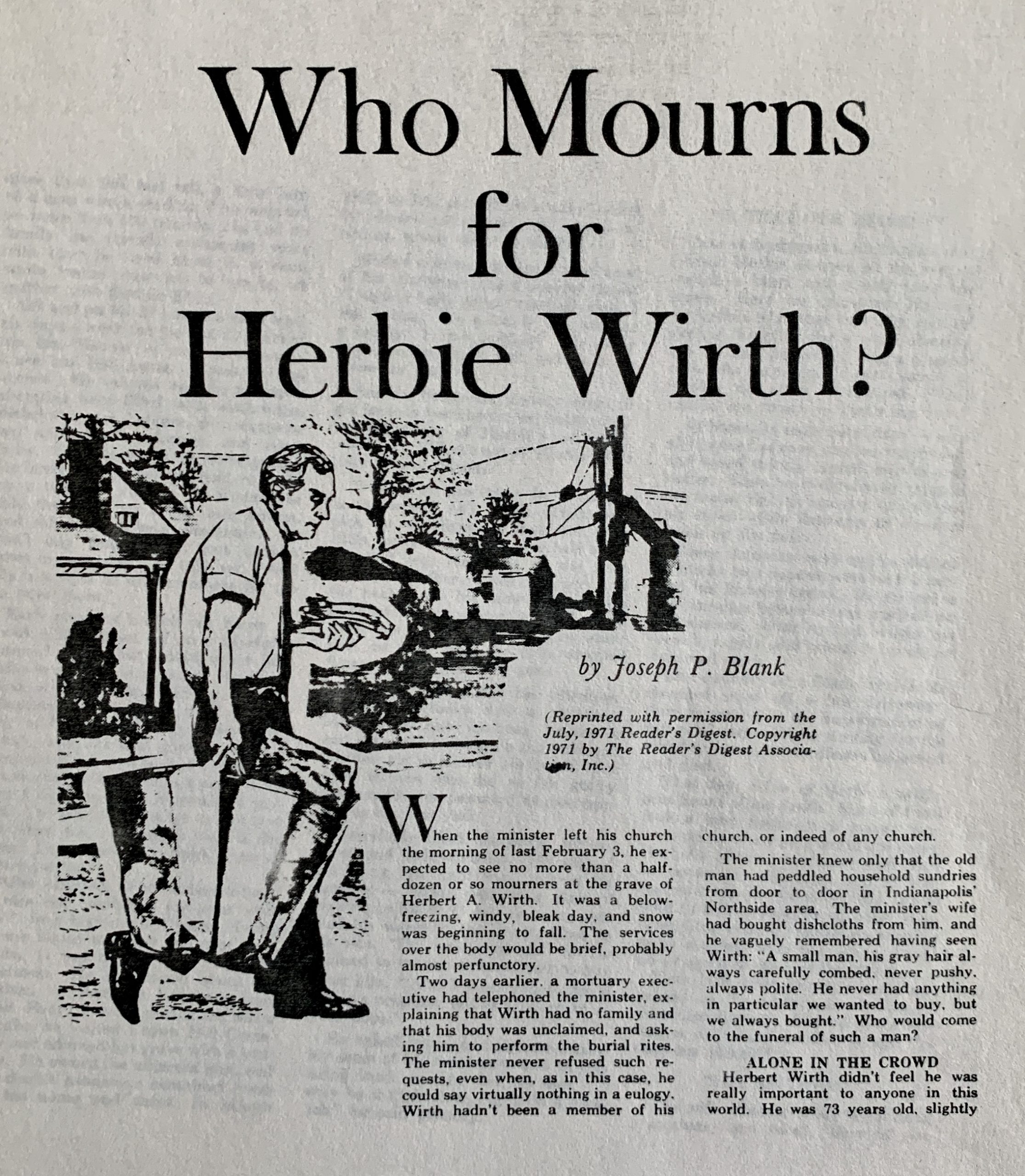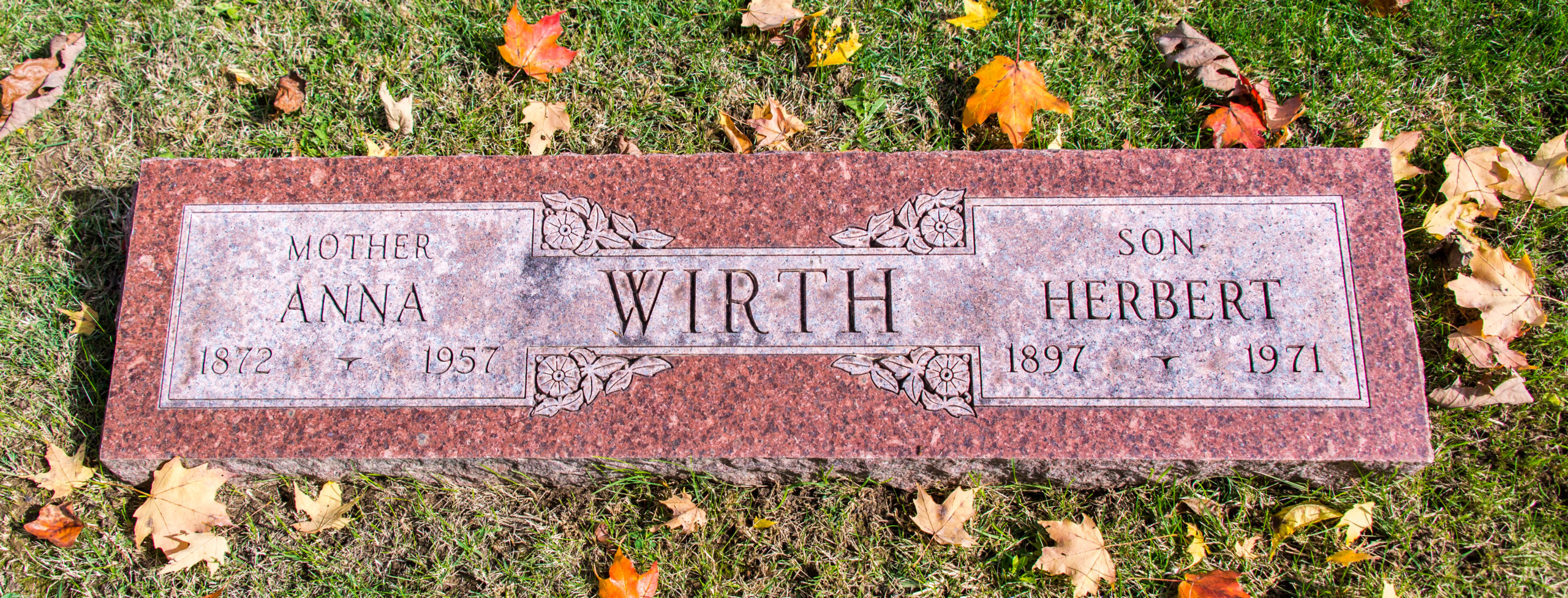Herbert (Herbie) A. Wirth, Humble Salesman Who Had One of Crown Hill’s Largest Funerals

(June 1897-January 30, 1971)
Herbie was a bird of a man, scarcely five feet tall, maybe a hundred or so pounds. Each day, six days a week, he would head out on his route — an elderly, stooped man with two shopping bags filled with his wares: kitchen towels, washcloths, potholders, bandanas and an array of shoelaces in various hues.
Everything cost a quarter, except the fancy potholders a teenage neighbor girl crafted. They were 50 cents, but he did not take a commission. Door-to-door he would go with a smile, from 16th Street to Broad Ripple. It was his neighborhood, where he lived in a small house his mother left him when she died in 1957. “I’m your neighbor,” he would say to his customers in his high-pitched voice. Winter and summer, three times a year, he visited each door in his neighborhood, hurrying along in his polished shoes with his odd kind of shuffle-jog. He did it for more than 25 years, since 1944 when he was laid off at age 57 from his job in a dry goods store. Herbie, his customers called him.
Wirth was always polite, always smiling, happy to hear “no,” ready to hear “yes,” always ready to chat. For those who took the time, he would tell them he should have gotten married when he was young. It was a lonely life without a family. Not self-pitying, just telling the truth. Sometimes a housewife would say he was not without friends, all his neighbors knew him. “Well, I do run into a lot of people in my work,” he would say before heading to the next door.
Wirth knew Crown Hill well. Each Sunday in the warm months, he visited his mother’s grave in Lot 89 on Section 78 to leave a bouquet of flowers. Her headstone was a double one, with his name and birthdate already inscribed. Knowing he was alone, he had also taken care of his funeral, paying Flanner & Buchanan $749.26 for a gray casket and the burial expenses. Not too many years later, Indianapolis Star columnist Tom Keating wrote a profound article about Wirth, who explained his sales psychology and philosophy of life. He understood his place in the social hierarchy yet recognized his capacity to make the world a better place. He told Keating, “There won’t be much of a dent in the world when I die, but at least I can say I made an honest-to-God try to do what I did as a nice man.”
 On January 30, 1971, Wirth died of a heart attack in a northside supermarket, where he was waiting for the weekly shipment of his favorite bread. There was some initial concern about the funeral arrangements, but then folks learned that Herbie had taken care of things. He had specified he did not want a service in a funeral home or church. He just wanted a graveside service at the cemetery — “and that some people be there.” Keating again wrote about Wirth in the Indianapolis Star, telling his readers that the Crown Hill service for him would be at 10 a.m. on Wednesday morning, and the minister would be at the 34th Street gate to meet anyone wishing to attend. “It would be a shame if no one showed up,” Keating wrote.
On January 30, 1971, Wirth died of a heart attack in a northside supermarket, where he was waiting for the weekly shipment of his favorite bread. There was some initial concern about the funeral arrangements, but then folks learned that Herbie had taken care of things. He had specified he did not want a service in a funeral home or church. He just wanted a graveside service at the cemetery — “and that some people be there.” Keating again wrote about Wirth in the Indianapolis Star, telling his readers that the Crown Hill service for him would be at 10 a.m. on Wednesday morning, and the minister would be at the 34th Street gate to meet anyone wishing to attend. “It would be a shame if no one showed up,” Keating wrote.
People showed up. Droves of people showed up. Hundreds of cars. A thousand mourners. Rich and poor, black and white, young and old, hippies, soldiers, businessmen, all gathered together in Crown Hill to remember a nice man. As it turned out, one of Crown Hill’s largest memorial services was not for a statesman, a celebrity, or a plutocrat. It was for Wirth. Inspired by the outpouring of care, Robert C. Braun, director of Historic Landmarks Foundation of Indiana, rushed to the Waiting Station tower, where the freshly re-roped cemetery bell had hung un-rung for 40 years. Braun began pulling the bell rope, tolling, tolling, for a half-hour tolling until his hands were blistered, and then he tolled the slow, mournful death knell for one small man who succeeded in making the world a better place.
Written by Douglas Wissing, from Crown Hill History|Spirit|Sanctuary
Location: Section 78, Lot 89; GPS (39.8234371,-86.1724445)
– The New York Times covered the story. Read it here.
– A longer account can be found in the July 1971 Reader’s Digest, titled “Who Mourns for Herbie Wirth” by Joseph P. Blank

